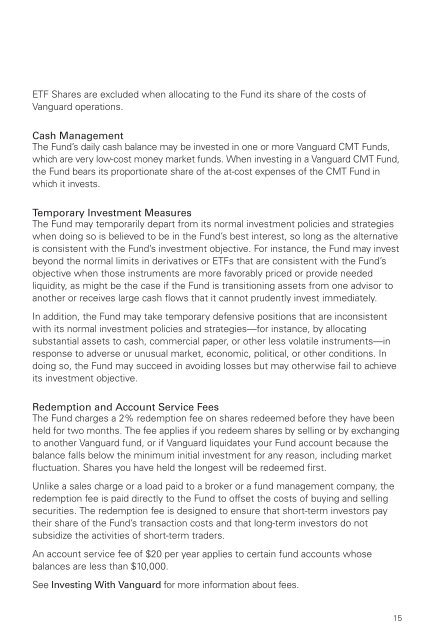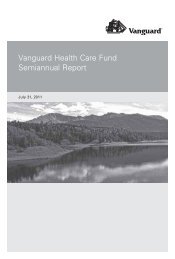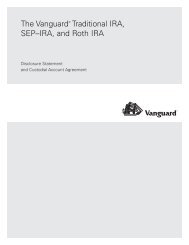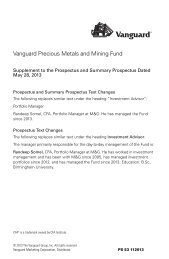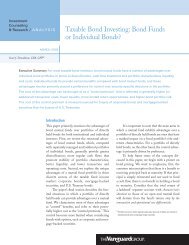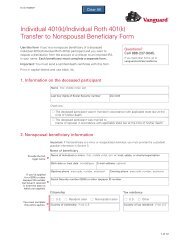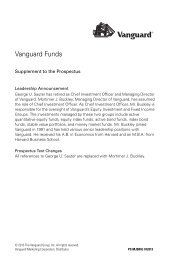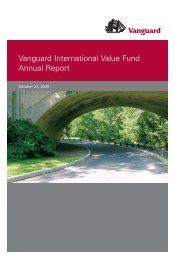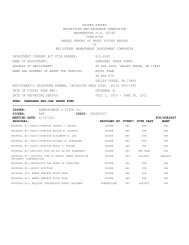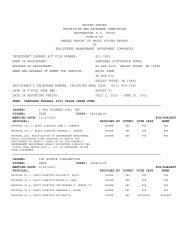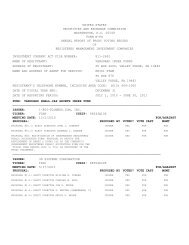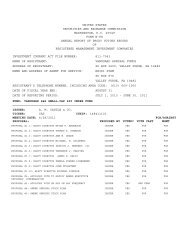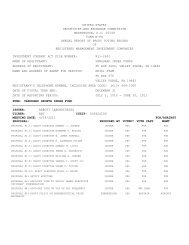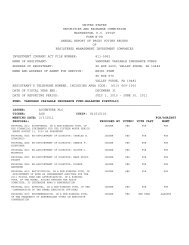Vanguard International Growth Fund Prospectus Investor and Admiral
Vanguard International Growth Fund Prospectus Investor and Admiral
Vanguard International Growth Fund Prospectus Investor and Admiral
You also want an ePaper? Increase the reach of your titles
YUMPU automatically turns print PDFs into web optimized ePapers that Google loves.
ETF Shares are excluded when allocating to the <strong>Fund</strong> its share of the costs of<br />
<strong>Vanguard</strong> operations.<br />
Cash Management<br />
The <strong>Fund</strong>’s daily cash balance may be invested in one or more <strong>Vanguard</strong> CMT <strong>Fund</strong>s,<br />
which are very low-cost money market funds. When investing in a <strong>Vanguard</strong> CMT <strong>Fund</strong>,<br />
the <strong>Fund</strong> bears its proportionate share of the at-cost expenses of the CMT <strong>Fund</strong> in<br />
which it invests.<br />
Temporary Investment Measures<br />
The <strong>Fund</strong> may temporarily depart from its normal investment policies <strong>and</strong> strategies<br />
when doing so is believed to be in the <strong>Fund</strong>’s best interest, so long as the alternative<br />
is consistent with the <strong>Fund</strong>’s investment objective. For instance, the <strong>Fund</strong> may invest<br />
beyond the normal limits in derivatives or ETFs that are consistent with the <strong>Fund</strong>’s<br />
objective when those instruments are more favorably priced or provide needed<br />
liquidity, as might be the case if the <strong>Fund</strong> is transitioning assets from one advisor to<br />
another or receives large cash flows that it cannot prudently invest immediately.<br />
In addition, the <strong>Fund</strong> may take temporary defensive positions that are inconsistent<br />
with its normal investment policies <strong>and</strong> strategies—for instance, by allocating<br />
substantial assets to cash, commercial paper, or other less volatile instruments—in<br />
response to adverse or unusual market, economic, political, or other conditions. In<br />
doing so, the <strong>Fund</strong> may succeed in avoiding losses but may otherwise fail to achieve<br />
its investment objective.<br />
Redemption <strong>and</strong> Account Service Fees<br />
The <strong>Fund</strong> charges a 2% redemption fee on shares redeemed before they have been<br />
held for two months. The fee applies if you redeem shares by selling or by exchanging<br />
to another <strong>Vanguard</strong> fund, or if <strong>Vanguard</strong> liquidates your <strong>Fund</strong> account because the<br />
balance falls below the minimum initial investment for any reason, including market<br />
fluctuation. Shares you have held the longest will be redeemed first.<br />
Unlike a sales charge or a load paid to a broker or a fund management company, the<br />
redemption fee is paid directly to the <strong>Fund</strong> to offset the costs of buying <strong>and</strong> selling<br />
securities. The redemption fee is designed to ensure that short-term investors pay<br />
their share of the <strong>Fund</strong>’s transaction costs <strong>and</strong> that long-term investors do not<br />
subsidize the activities of short-term traders.<br />
An account service fee of $20 per year applies to certain fund accounts whose<br />
balances are less than $10,000.<br />
See Investing With <strong>Vanguard</strong> for more information about fees.<br />
15


